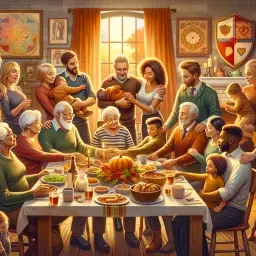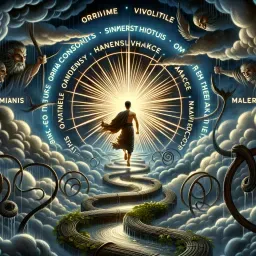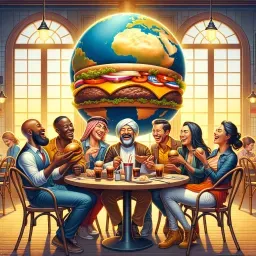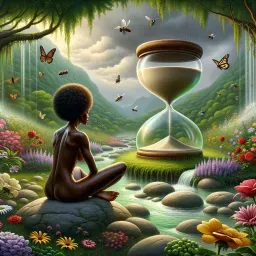I love you, Honey Bunny

0
0
0
0
- Meaning
- The phrase encapsulates a deep emotional connection marked by affection and intimacy. It expresses love in a light-hearted manner, reflecting both warmth and playfulness in relationships. Such expressions often resonate with the psychological need for connection and affirmation of feelings in romantic partnerships.
- Allegory
- The image includes a couple in an affectionate embrace, representing deep emotional connection and intimacy expressed in the phrase. The city skyline symbolizes the hustle of life that often surrounds love, while the soft glowing lights and pastel colors evoke warmth and happiness. The playful rabbit included as a symbol of 'Honey Bunny' adds humor and reflects the playful tone of the original phrase, suggesting that love can be both serious and fun.
- Applicability
- This phrase can be applied in personal life as a reminder to openly express love and affection towards partners or loved ones. It encourages the use of playful terms of endearment that foster closeness and maintain a positive, loving atmosphere in relationships.
- Impact
- The impact of the phrase on popular culture is significant, as it became a catchphrase highlighting romantic and intimate connection. The film's success led to a resurgence of appreciation for unique phrases and dialogues in cinema, influencing how relationships are depicted in film and media.
- Historical Context
- The phrase originated in 1994 as part of the dialogue in the film 'Pulp Fiction'. Its context within the film emphasizes street culture and the vibrancy of love amidst chaos, highlighting a unique blend of romance and crime.
- Criticisms
- While the phrase is generally seen as sweet, the association with 'Pulp Fiction' might lead some to critique it for being too casual or flippant in the context of serious relationships, though this can also be countered by the argument that light-heartedness can enhance intimacy.
- Variations
- Variations of the phrase can be found in various cultures, using different terms of endearment. For instance, in Spanish-speaking cultures, one might say "Te quiero mucho, mi amor," which carries a similar emotional weight but with cultural nuances in expression.
-

I’m gonna get medieval on your ass.
-

I'm sorry, did I break your concentration?
-

You ever heard the philosophy that once a man admits that he's wrong, he is immediately forgiven for all wrongdoings?
-

You are my older brother, and I love you. But don’t ever take sides with anyone against the family again. Ever.
-

Zed’s dead, baby. Zed’s dead.
-

The path of the righteous man is beset on all sides by the inequities of the selfish and the tyranny of evil men.
-

Be cool, Honey Bunny.
-

Fredo, you’re my older brother and I love you. But don’t ever take sides with anyone against the family again.
-

You know what they call a Quarter Pounder with Cheese in Paris?
-

Say 'what' again. I dare you, I double dare you!
-

Bring out the gimp.
-

Don't sweat the small stuff.
No Comments